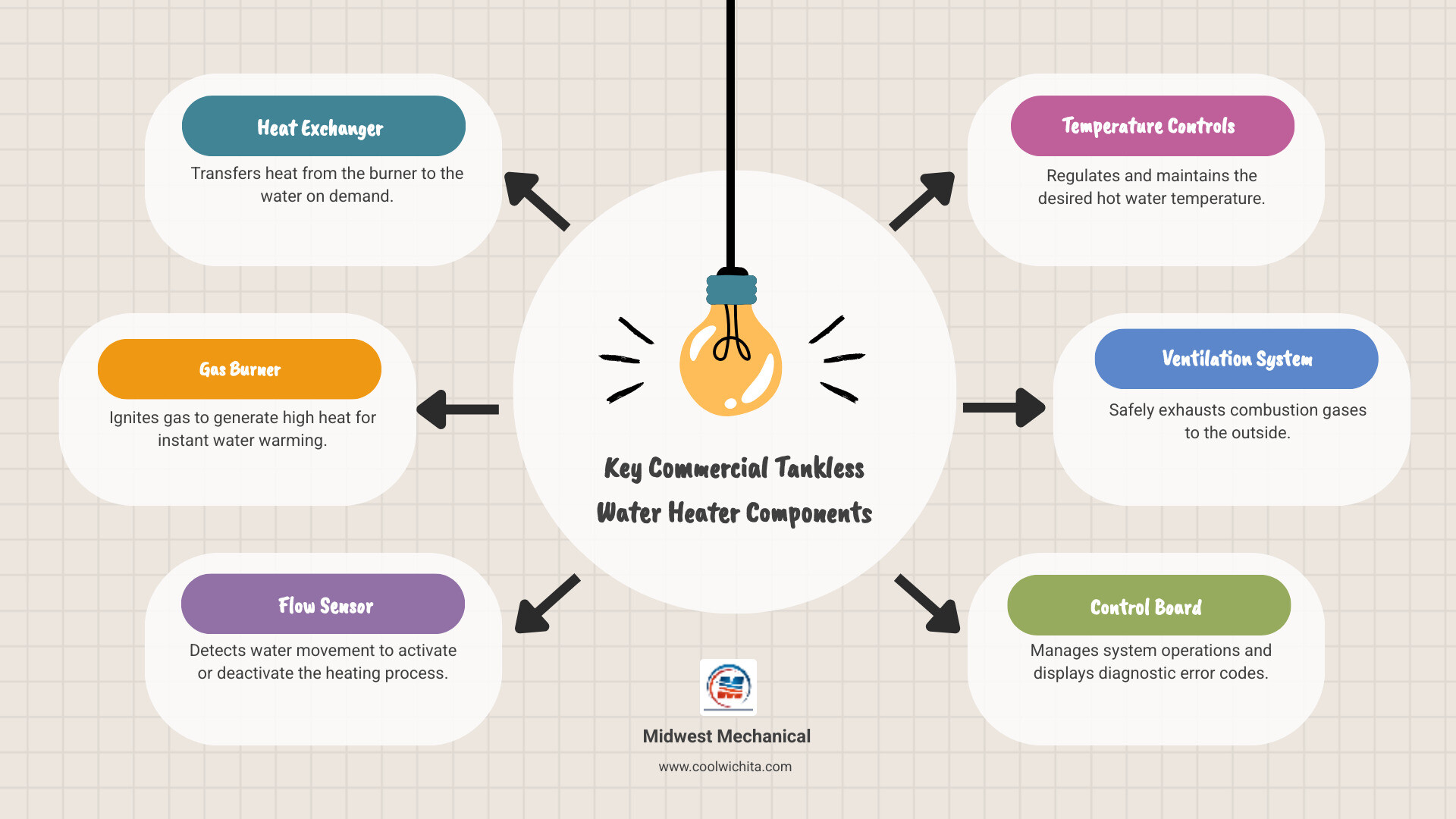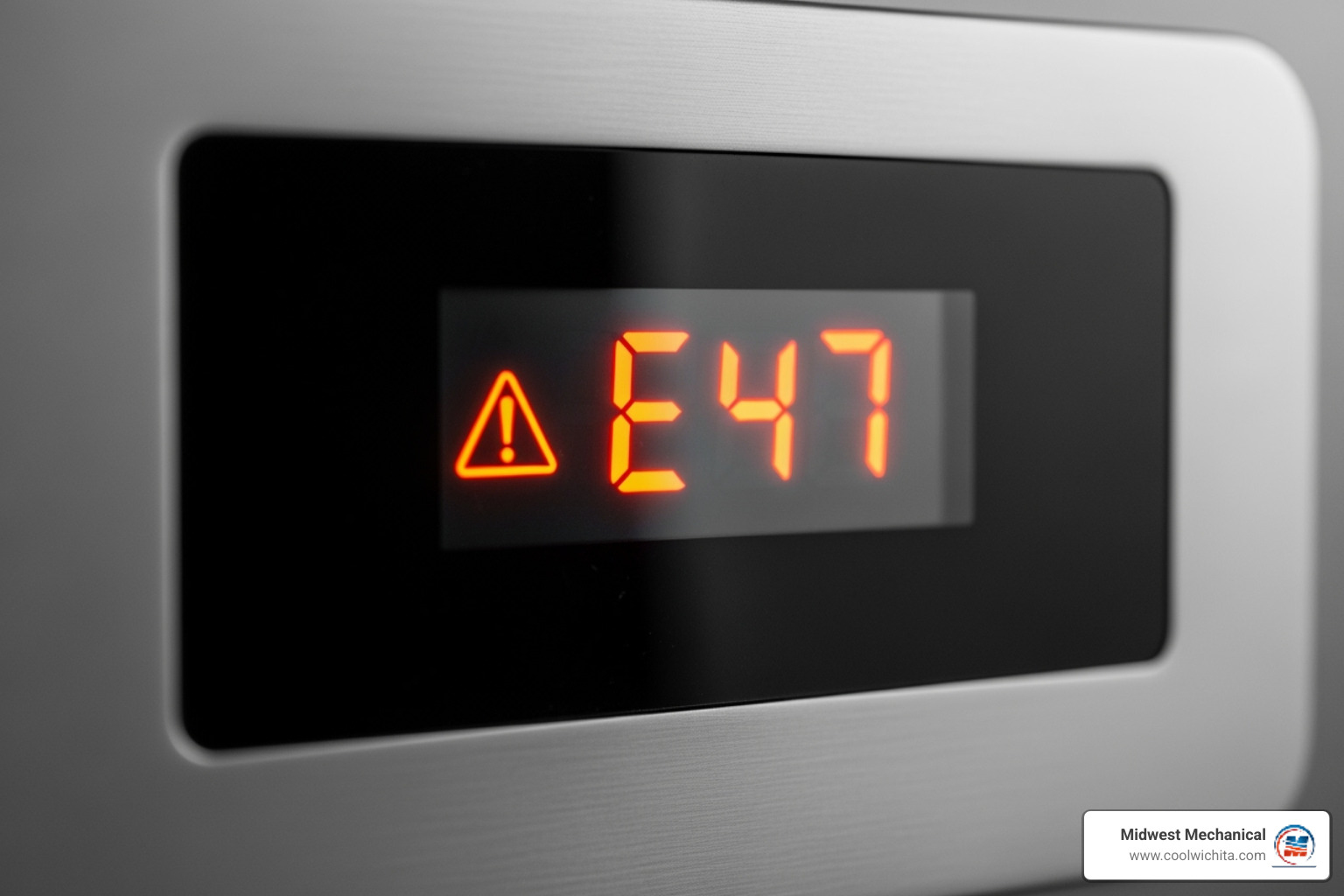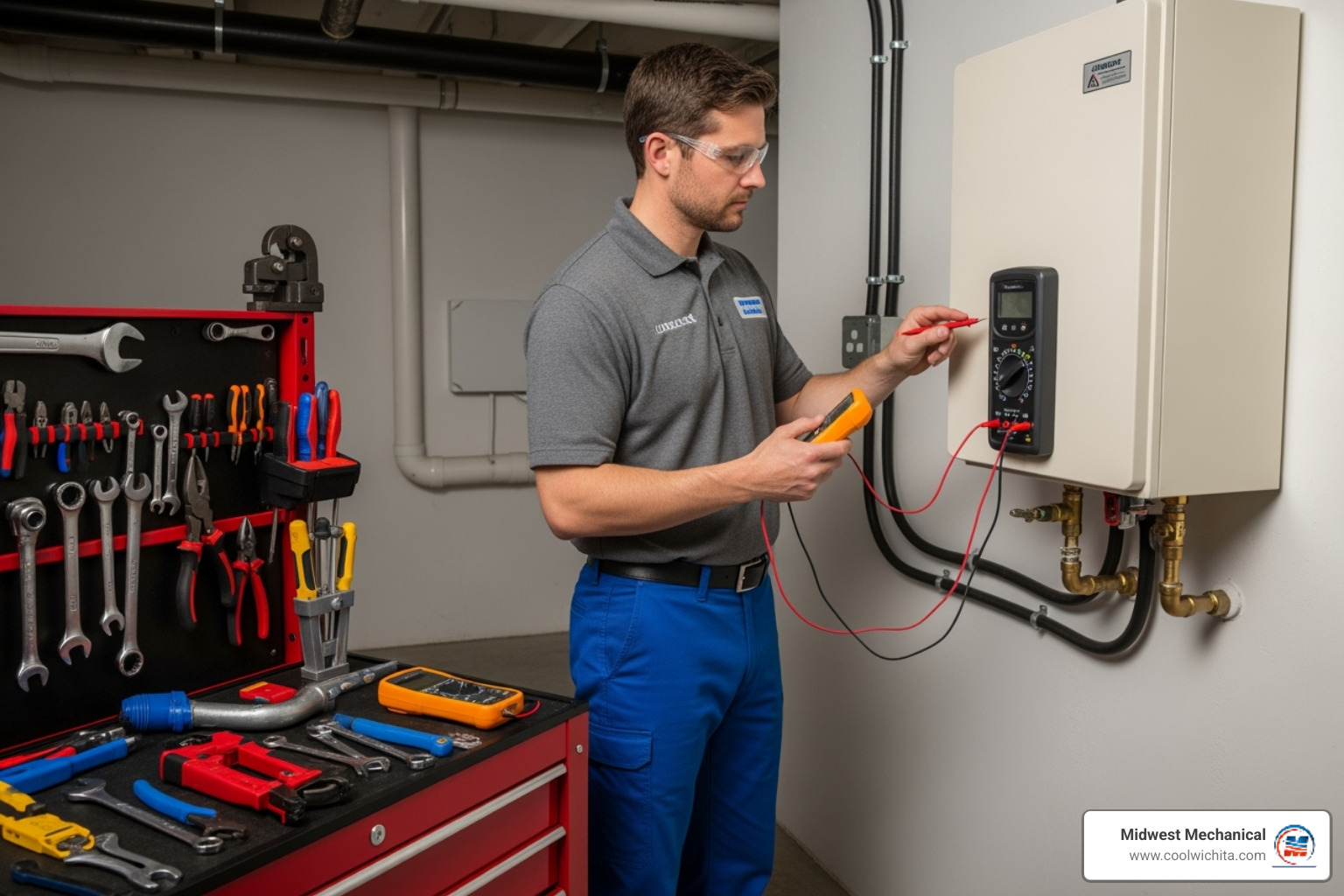Why Tankless Water Heater Repair Matters for Your Business
Tankless water heater repair is essential for maintaining consistent hot water supply in commercial settings. When your on-demand water heating system fails, it can disrupt business operations and leave customers and employees without the hot water they need.
Common tankless water heater repairs include:
- Ignition failures - Gas supply line or electrical issues preventing startup
- Temperature inconsistencies - Faulty thermostats or mineral buildup affecting performance
- Flow sensor problems - Reduced water pressure or intermittent heating
- Ventilation blockages - Restricted airflow causing safety shutdowns
- Error code diagnostics - System alerts indicating specific component failures
Unlike traditional tank systems, tankless units heat water on demand, making them 24% to 34% more energy-efficient for businesses using moderate amounts of hot water daily. However, this efficiency depends on proper maintenance and timely repairs.
Key warning signs that indicate your commercial tankless system needs professional attention include fluctuating water temperatures, unusual noises like rumbling or popping, visible leaks around connections, and digital error codes on the unit's display.
The complexity of commercial tankless systems - with their gas lines, electrical components, and safety sensors - requires professional expertise to diagnose and repair safely. Most units have a lifespan of 15 to 20 years when properly maintained, but neglecting repairs can lead to premature failure and costly emergency replacements.

Identifying the Need for Repair: Key Warning Signs
When your commercial tankless water heater starts acting up, it rarely happens without warning. Just like your car makes strange noises before it breaks down, your water heater gives you clues that something's not quite right. The trick is knowing what to look for before a minor issue becomes a major headache.
Inconsistent temperatures are often the first sign that something's off. One minute your water is perfectly hot, the next it's lukewarm or even cold. This isn't just frustrating for your staff and customers - it can seriously disrupt operations that depend on steady water temperatures, like commercial kitchens or laundry facilities.
Reduced water pressure is another red flag that shouldn't be ignored. If hot water is barely trickling from your faucets while cold water flows normally, the problem likely lies within your tankless unit. This often points to mineral buildup restricting water flow through the system.
Don't ignore strange noises coming from your unit either. Tankless water heaters are designed to run quietly, so any new sounds - whether it's banging, popping, or rumbling - deserve your attention. These noises usually indicate internal problems that need professional diagnosis.
Finally, any visible leaks or moisture around your tankless unit should set off alarm bells. Even a small drip can quickly escalate into water damage and system failure. When you spot any of these warning signs, it's time to take action. For a complete breakdown of what to watch for, check out our guide on Signs for Water Heater Repair.
Understanding Diagnostic Error Codes
Modern commercial tankless water heaters are pretty smart machines. When something goes wrong, they'll often display diagnostic error codes on their digital screens - think of them as your unit's way of telling you exactly what's bothering it.

When an error code pops up, your unit might go into system lockout mode. This isn't your heater being dramatic - it's actually protecting itself from further damage or preventing unsafe conditions. Your manufacturer manual usually explains what each code means, but understanding what's actually causing the problem is where things get tricky.
That's where professional diagnosis becomes essential. An error code might say "flame failure," but the real culprit could be anything from a dirty flame sensor to a gas supply issue. Our technicians know how to read between the lines and identify whether you're dealing with simple sensor failures or something more complex that needs immediate attention.
Common Problems That Require Professional Attention
While you might be tempted to troubleshoot your tankless water heater repair issues yourself, commercial units are complex systems that combine high-pressure gas, electricity, and water. Some problems definitely need professional hands to fix them safely.
Ignition failure is one of the most common issues we see. Your unit simply won't light the gas burner to heat water. This could be a faulty igniter, problems with your gas supply, or electrical issues preventing the ignition sequence from starting properly.
Flame loss is equally frustrating - the burner lights up but then goes out unexpectedly. Usually, this points to a malfunctioning flame sensor, inadequate combustion air, or issues with the gas regulator. These aren't just inconveniences; they can create real safety hazards if not handled correctly.
Overheating sensors are designed to protect your system by shutting it down when water gets too hot. Sometimes the sensor itself goes bad and sends false readings, causing unnecessary shutdowns. Other times, it's doing its job because something else is causing actual overheating.
Blocked ventilation is particularly serious for gas-fired units. Proper venting removes dangerous combustion byproducts from your building. When vents get blocked, you risk carbon monoxide buildup and automatic system shutdowns for safety reasons.
If you're experiencing any of these issues - especially if you have No Hot Water at all - it's time to call in the experts. Our team has the specialized tools and training to diagnose and repair these intricate systems safely and effectively.
The Professional Tankless Water Heater Repair Process: Safety, Tools, and Fixes
When your business needs tankless water heater repair, you want to know it's being handled by professionals who take safety seriously. These units pack a powerful punch—combining natural gas or high-voltage electricity with pressurized water systems. One wrong move can turn a simple repair into a dangerous situation, which is exactly why we never cut corners on safety protocols.
Before our technicians even touch a wrench, we follow a strict shutdown sequence. First comes the gas supply shutoff—we completely isolate the gas line to prevent any accidental leaks or ignition. For electric units, we flip the electrical breaker shutoff, cutting all power to eliminate any risk of shock. Finally, we handle water valve isolation, stopping the flow to and from the unit. This three-step safety dance might seem overly cautious, but it's what keeps everyone safe and prevents water damage during repairs.
Now, here's something that might surprise you: your average toolbox won't cut it for commercial tankless systems. These sophisticated machines require specialized equipment that most property owners simply don't have lying around.
Our repair arsenal includes multimeters for electrical diagnostics to pinpoint voltage issues, gas pressure gauges that give us precise readings, and specialized wrenches and pipe cutters designed for commercial plumbing work. We also carry hex key sets for accessing internal components, cleaning brushes and descaling pumps for maintenance work, and infrared thermometers for accurate temperature verification. Of course, we never forget our personal protective equipment—safety glasses and gloves are non-negotiable. Perhaps most importantly, we bring manufacturer-specific diagnostic tools and software that can communicate directly with your unit's control systems.
The Impact of Mineral Buildup and How to Fix It
If there's one villain in the tankless water heater world, it's mineral buildup. Here in Wichita, our hard water is notorious for leaving behind unwanted guests—calcium and magnesium deposits that create a crusty layer called limescale inside your unit's heat exchanger.
Think of limescale as an unwelcome blanket wrapped around your heating elements. This hard water scale acts like insulation, forcing your unit to work overtime just to heat the water. The result? Reduced efficiency, higher energy bills, and components that wear out faster than they should.
You'll often hear the problem before you see it. Those popping or rumbling noises coming from your unit? That's water actually boiling within the scale layers—definitely not something you want happening inside your expensive equipment.
The solution is a process called descaling, where we circulate a mild acidic solution through the heat exchanger to dissolve those stubborn mineral deposits. It's like giving your unit a deep clean from the inside out. Regular descaling is recommended annually, especially in areas with hard water like ours, and it's one of the best investments you can make in your system's longevity.
Ignoring mineral buildup isn't just about efficiency—it can lead to reduced flow rates, wildly inconsistent temperatures, and eventually, expensive component failures. For more details on how sediment affects your system, check out our guide on Sediment Buildup in Derby Water Heaters.
Step-by-Step Guide to Common Tankless Water Heater Repair
While we always recommend leaving repairs to the professionals, understanding our process can help you appreciate what goes into keeping your system running smoothly. Every repair follows a methodical approach—no guesswork, no shortcuts.
When we encounter ignition failures, our first stop is always the ignition system check. We inspect the igniter, flame sensor, and gas valve with the precision of a detective examining clues. Sometimes the fix is surprisingly simple—a dirty flame sensor just needs a good cleaning. Other times, we might need to adjust gas pressure or replace electrical components.
For businesses dealing with temperature inconsistencies, we move on to thermostat testing. We verify that your thermostat is reading temperatures correctly and communicating properly with the control board. From there, we tackle flow sensor cleaning. A dirty flow sensor can send mixed signals about water demand, causing your unit to heat water inconsistently. We've helped many businesses resolve water heater fluctuations with these targeted repairs.
The gas valve inspection is where things get particularly technical. We check gas pressure levels, ensure the valve opens and closes on command, and verify that gas flow matches your unit's requirements. Any problems here can cause flame failures or insufficient heating—issues that require immediate professional attention.

Throughout every repair, we use only high-quality, manufacturer-approved parts. It might cost a bit more upfront, but it ensures your repairs last and your warranty stays intact. After all, there's nothing worse than fixing the same problem twice.
Repair vs. Replace: Making the Right Financial Decision for Your Business
Making the decision between repairing or replacing your commercial tankless water heater can feel overwhelming. We get it—nobody wants to spend money unnecessarily, but you also can't afford to keep throwing good money after bad. Let's walk through this together and figure out what makes the most financial sense for your business.
The first thing we look at is your unit age. Most commercial tankless water heaters have a solid lifespan of 15 to 20 years when properly maintained. If your unit is still relatively young (under 10 years old) and this is its first major hiccup, a repair is usually the smart choice. But if your trusty water heater is getting up there in years and starting to act like a cranky old appliance, replacement might be the way to go.
Repair frequency tells us a lot about your unit's health. One repair every few years? That's normal wear and tear. But if we're becoming regular visitors to your business because something new breaks every few months, that's your water heater's way of saying it's ready to retire.
When we do a cost analysis, we're looking at the big picture. Tankless water heater repair costs can vary quite a bit—from simple fixes to more complex component replacements. The general rule of thumb we follow is this: if the repair cost creeps up to about half the price of a new unit, replacement usually makes better financial sense.
Here's where things get exciting—the energy savings potential. According to a study by the U.S. Department of Energy, tankless water heaters are 24%–34% more energy-efficient than traditional tank systems for moderate daily hot water use. While this study focused on residential use, the energy efficiency benefits scale up beautifully for commercial applications. A new, efficient unit can significantly reduce your monthly utility bills, and those savings add up fast over the years.
If you're wrestling with this decision, our article on When to Replace Your Water Heater can provide additional guidance custom to your specific situation.
When to Choose Replacement Over Tankless Water Heater Repair
Sometimes the writing is on the wall, and that writing says "time for a new water heater." We've seen enough units over the years to recognize when repair just doesn't make sense anymore. Here are the clear indicators that point toward replacement:
| Criteria | Repair Makes Sense | Time to Replace |
|---|---|---|
| Unit Age | Under 10 years old | Approaching or past the 15-20 year mark |
| Repair History | First major issue | Multiple repairs per year |
| Problem Type | Minor component failure | Major leaks, severe corrosion, heat exchanger issues |
| Parts Availability | Easy to find | Obsolete parts or discontinued components |
| Performance | Still running efficiently | Rising energy bills, inconsistent temperatures |
| Repair Cost | Well under half of replacement cost | Exceeds 50% of new unit price |
When your unit hits that 15-20 year lifespan mark, even a successful repair might just be buying you a few more months before the next component fails. It's like fixing the transmission on a car with 300,000 miles—you might get it running, but what's going to break next?
Major leaks are often the final straw, especially when they're coming from the heat exchanger. These aren't small drips you can patch up; they're signs of fundamental structural problems. Similarly, severe corrosion inside the unit means the damage has spread throughout the system, making effective repairs nearly impossible.
One frustrating scenario we encounter is when manufacturers discontinue parts for older models. Even if we can diagnose the problem perfectly, obsolete parts make repair impossible. It's like trying to fix a flip phone in 2024—the parts just aren't made anymore.
Finally, if you've noticed rising energy bills despite similar usage patterns, your unit's efficiency has likely declined significantly. At that point, the monthly savings from a new, efficient model can help offset the replacement cost over time.
The Long-Term Benefits of Regular Maintenance
Here's something that might surprise you: the best way to avoid the repair-versus-replace dilemma altogether is regular maintenance. Think of it as an insurance policy for your hot water system—a small investment now that can save you thousands down the road.
Regular maintenance delivers an extended lifespan for your tankless water heater. While these units can naturally last 15 to 20 years, proper care can push them even further. Annual descaling, especially in our hard water area, keeps mineral buildup from choking your system. Component inspections catch small problems before they become big, expensive ones.
Peak efficiency is another major benefit. A well-maintained unit uses less energy to heat the same amount of water, which translates directly to lower utility bills. Over the years, these savings can be substantial for your business. Plus, you'll have the peace of mind that comes with preventing breakdowns. There's nothing worse than losing hot water during your busiest hours—regular maintenance helps ensure that doesn't happen.
Don't overlook the safety checks that come with professional maintenance. We verify that gas lines, electrical connections, and ventilation systems are all secure and functioning properly. This isn't just about keeping your water heater running; it's about keeping your business and employees safe.
Finally, many manufacturers require documented annual servicing to maintain warranty compliance. Regular maintenance keeps that warranty valid, protecting your investment if a major component fails unexpectedly. Our comprehensive approach to Preventing Water Heater Failures ensures your system stays reliable year after year.
The bottom line? Regular maintenance is the best investment you can make in your tankless water heater's future. It keeps repair costs low, extends the unit's life, and helps you avoid that tough repair-versus-replace decision for as long as possible.
Frequently Asked Questions about Commercial Tankless Water Heater Repair
Over the years, we've heard just about every question you can imagine about tankless water heater repair. Whether you're a restaurant owner dealing with inconsistent hot water or a hotel manager worried about repair costs, these are the questions that keep business owners up at night. Let's tackle the big ones together.
How long do commercial tankless water heaters typically last?
Here's some good news for your budget: with proper maintenance, most commercial-grade tankless units have a lifespan of 15 to 20 years, often lasting longer than traditional tank-style heaters. That's almost double the life of a conventional water heater, which makes them a smart long-term investment for your business.
But here's the catch—that impressive lifespan comes with a condition. Regular maintenance is absolutely essential, especially in areas like Wichita where hard water can wreak havoc on your system. Annual descaling isn't just a suggestion; it's the difference between a unit that lasts two decades and one that starts failing after just a few years.
Think of it like a well-maintained delivery truck versus one that never gets an oil change. Both might start strong, but only one will still be running reliably after years of hard work. The same principle applies to your tankless water heater.
Is it more cost-effective to repair or replace my unit?
This is probably the question that causes the most sleepless nights for business owners, and honestly, we get it. Nobody wants to make the wrong financial decision, especially when it affects daily operations.
Here's our rule of thumb: if the repair cost is more than 50% of the price of a new unit, or if the heater is over 15 years old and requires frequent service, replacement is usually the more economical choice. We know that sounds like a big expense upfront, but stick with us on the math.
Let's say you're facing a repair bill every few months on an aging unit. Those costs add up fast, and meanwhile, your old system is probably guzzling energy like a gas-hungry truck from the 1980s. A new unit will be more efficient, more reliable, and won't leave you scrambling for hot water during your busiest hours.
We've seen too many business owners try to squeeze just one more year out of a failing unit, only to face an emergency breakdown during peak season. Sometimes the smart money is on making the switch before you're forced into it.
What causes my tankless system to provide lukewarm water?
Nothing's more frustrating than turning on what should be hot water and getting something that feels like it came from a lukewarm swimming pool. The good news is that lukewarm water usually points to a few specific, fixable issues.
Mineral buildup is the most common culprit, especially here in Kansas where hard water is a fact of life. When minerals clog up your heat exchanger, it's like trying to heat water through a thick winter coat—the heat just can't get through efficiently.
Another possibility is a malfunctioning mixing valve that's not doing its job of properly blending hot and cold water. It might be stuck in a position that's giving you more cold water than you bargained for.
Finally, there could be an issue with the heating element or gas burner itself. Maybe it's not firing at full capacity, or there's a problem with the gas supply that's keeping it from generating enough heat to meet your demands.
The tricky part is that these symptoms can look identical from the outside, which is why professional diagnosis is so important. We have the tools and experience to pinpoint exactly what's going wrong and get your hot water back to where it should be—actually hot.
Conclusion
When it comes to keeping your business running smoothly, few things are as frustrating as unreliable hot water. Whether you're running a busy restaurant, managing a hotel, or operating any commercial facility, your customers and employees depend on consistent hot water every single day.
The good news? Tankless water heater repair doesn't have to be a mystery or a major headache. By staying alert to warning signs like temperature fluctuations, strange noises, or error codes, you can catch problems early before they turn into costly emergencies. That proactive maintenance we talked about isn't just a nice-to-have—it's your best defense against unexpected breakdowns and the key to maximizing your investment.
Timely repairs make all the difference between a minor service call and a major system replacement. When you address issues quickly, you're not just fixing today's problem; you're protecting your business continuity and avoiding those dreaded moments when your operations grind to a halt because there's no hot water.
The energy cost savings from a well-maintained tankless system add up faster than you might think. These units are already more efficient than traditional water heaters, but only when they're running properly. Regular descaling, professional tune-ups, and prompt repairs keep that efficiency at its peak, which means lower utility bills month after month.
At Midwest Mechanical, we've seen it all when it comes to commercial hot water systems. We know that every day your system is down costs your business money and creates stress for everyone involved. That's why we focus on getting things right the first time, using quality parts and proven techniques that stand the test of time.
Whether your tankless water heater needs a simple cleaning, a complex component replacement, or you're trying to decide between repair and replacement, we're here to guide you through the process with honest advice and transparent service.
For expert commercial plumbing services in Wichita, KS, contact us today! Let's keep your hot water flowing and your business thriving.
Customer Testimonials
Hear from satisfied customers who trust us for reliable HVAC and plumbing service across Wichita.






Plus, the technician, Lee was very professional, knowledgeable and informative.
We will definitely be doing business with them sometime again in the past.


I'm prompt to my appointment. Thank you Midwest Mechanical.









We have partnered with GoodLeap to offer flexible payment options for your project. GoodLeap uses a soft credit check until funding and the highest score from all 3 bureaus to see if you qualify. It also takes just a few minutes to get started.




Service Areas
.svg)




